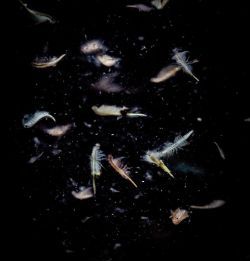
CENSIS is working with Aquanzo, an Edinburgh-based start-up, to support the growth of the global aquaculture sector with the development of a new, modular farm system as a sustainable and decentralised alternative to producing a scarce fishmeal ingredient.
Aquanzo’s plan is to farm artemia, a species of brine shrimp widely considered to be the best source of protein available for feeding fish and crustacea. The project has is funded by Innovate UK and the Biotechnology and Biological Sciences Research Council (BBSRC), and is being supported by Boortmalt – one of the world’s largest malting companies.
Artemia are typically found in warm, salty water, occurring naturally in salt lakes in the USA, China, and Eurasia. The specific conditions in which they grow means the supply of the shrimp is very restricted – particularly for countries far away from their natural breeding grounds, which need to import them. The situation has been exacerbated recently by the Covid-19 pandemic and the war in Ukraine, which have hit supply chains.
The growing scarcity of marine ingredients has meant that feed increasingly relies on plant-based alternatives to fishmeal as a protein source. The current global average for marine ingredients in fish feed is less than 10%, according to experts – substantially down on 70% 30 years ago . However, research testing the composition of feed has found that not only do fish prefer feed containing marine ingredients, they also tend to be healthier compared with consuming plant-based protein .
The modular, recirculating aquaculture system (RAS) being developed by Aquanzo at Heriot-Watt University would allow artemia to be grown wherever they are required using the co-product of agricultural processes – in the first instance, the production of malt for the whisky industry. The water used to process malt is rich in minerals and organic matter – that can be used to raise brine shrimp and is currently largely treated as waste.
Deployed on land near agricultural processing facilities so that there is no impact on the marine ecosystem, the Aquanzo RAS system is expected to reduce the amount of CO2 created in the production of fishmeal by 20% compared with harvesting fish. All of the water will be re-used to further enhance its sustainability.
As part of the process and technical development, CENSIS engineers will collaborate with Aquanzo on the development of an IoT-enabled array of sensors and a ‘data lake’ – essentially a centralised repository for data – to help its production team collect, store, and process data. The technology will help the company progress towards the development of a fully mobile recirculating system, which can be located wherever agricultural by-products are available and remotely monitor the welfare and growth of artemia.